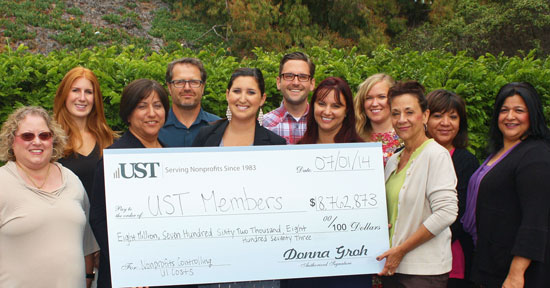
Unfortunately, for many states, the realization came a little too late.
During the height of the Recession, almost 40 states borrowed a combined $50 billion from the Federal Unemployment Trust Administration (FUTA) to continue providing jobless benefits. This much debt required many states to make long-term changes to their unemployment systems by either charging penalties or fees to businesses or by cutting jobless benefits. Many made historic cuts to the number of weeks of aid available, but some—like New Jersey which racked up more than $1.5 billion in debt—took a long, hard look at the administration of their trust.
In New Jersey that long, hard look at the administration of their unemployment trust fund resulted in some spectacular results. Over the past four years New Jersey has identified more than 300,000 people who tried to wrongly collect benefits through identity theft, failure to report a new job, schemes, and honest mistakes. Also:
But what did New Jersey do that set them on the path to successfully rebuild their unemployment trust fund?
They updated their system.
Namely, they began using a strategy referred to as ‘identity proofing.’ With the help of LexisNexis, the state of New Jersey requires applicants to verify a wide range of personal information through a quiz on the state labor department’s website. The questions are specifically developed to be ones that the individual who owns an identity could accurately answer.
Then, using the billions of public records that LexisNexis collects, the answers—which range from what kind of car an applicant has, to who lives at their address—help weed out potential frauds.
Less than a year-and-a-half into the effort, more than $4.4 million in improper payments have already been stopped, and almost 650 instances of identity theft have been avoided.
Want to know how well your state is catching improper payments? The U.S. Department of Labor provides this state-by-state breakdown for 2013.
Read more about how New Jersey is fighting improper payments and unemployment fraud here.

Follow these 5 easy steps to create sustainable changes within your nonprofit:
Change is what keeps nonprofits moving forward. Taking the time to foster cooperation amongst your employees is the easiest way to create lasting change—which provides ongoing opportunity for organizational growth within the nonprofit sector.
Learn more about how to gain employee support for organizational change here.

The Department of Labor (DOL) provides a short overview of the program on their website, and summarizes it by saying: “Unemployment Insurance is a federal-state program jointly financed through Federal and state employer payroll taxes. Generally, employers must pay both state and Federal unemployment taxes…However, some state laws differ from the Federal law and employers should contact their state workforce organizations to learn the exact requirements.”
The program itself works to provide jobless workers who have lost their job through no fault of their own with temporary, partial wages while they search for a new position. For more information on how unemployment insurance works, read our more complete overview on the state program.
Is Your Nonprofit Liable?
501(c)(3) nonprofits are exempt from federal unemployment taxes, but may be liable for state contributions if they meet something called the “4 for 20″ provision. This provision is triggered when four or more individuals are employed on the same day for 20 weeks in a calendar year, though not necessarily for consecutive weeks. It is important to note that who is considered “employed” for these purposes is not always straightforward – see Independent Contractors below.
Why Independent Contractors May Still Be Considered Employees
There are different rules and tests used by government organizations to determine independent contractor status, because different organizations are responsible for separate aspects of law. For the purposes of unemployment insurance, the Department of Labor uses something called the “ABC test”, which makes it sound simple, but is more complicated when applied to real situations.
The ABC Test establishes criteria that an work relationship must meet in order to for the services of that individual to not be considered employment. The three parts of the ABC Test relate to employer control/direction of the worker, place(s) of business or courses of business, and proof that the worker is independently established in the trade. A nonprofit may have to pay unemployment taxes even if the IRS or their state revenue services determine that, for income tax purposes, individuals may be independent contractors.
Cost-Saving Alternatives
The Unemployment Services Trust (UST) provides an alternative to paying into the state unemployment tax system, and can be a cost-saving option for nonprofits with more than 10 employees. Through UST, organizations directly reimburse the state only for the claims of their former employees, rather than paying the state unemployment insurance tax which covers all employers throughout the states.
And, because keeping unemployment costs low is vital to so many organizations across the U.S., we’ve added state-by-state information for taxable wage bases from the Department of Labor so you can see where your organization falls on the tax scale.
We encourage nonprofits to be proactive in learning what their options are, and what types of unemployment tax alternatives best suit their needs. Complete a complimentary Savings Evaluation to see if your organization could save money on its unemployment costs.
This post does not constitute official or legal advice. A version of this article originally appeared on blog.nonprofitmaine.org by Molly O’Connell.

Taking the time to plan out one’s budget, on a more consistent basis, can help an organization better identify, prioritize, and build towards their goals. To create an effective budget, follow these 6 simple steps:
In order to grow within the nonprofit sector, organizations must learn how to construct and abide by their determined budgets. Serving as a roadmap to achieving annual objectives, a well thought out budget can help nonprofits succeed without sacrificing excess funds.
Learn more about the importance of nonprofit budget planning here.

The speaker then asked the participants to perform the search again as a collaborative group. He suggested they each pick up one balloon and find the owner of that balloon.
If you haven’t already heard about the study findings, which recently began to go viral, all of the participants were sitting down, with their unique balloon, well before the 5 minute mark.
For the past couple of decades, researchers have been performing live social experiments like this one to illustrate the power of teamwork and collaborative effort. Out of this body of work has come some pretty powerful information that can improve your organization—and it’s collaborative results—if used well.
Not least among the information sets that have been discovered, is the fact that companies that have the best collaborative teams are 10 times more likely to reach high financial goals as those who don’t. So what is it that makes the best teams?
According to MIT researchers, the best teams:
If you’re team is not performing as well as you would like them to, or if your team is fairly homogenous—which researchers have repeatedly found discourages a healthy level of creativity— this article from the Society of Human Resources Management (SHRM) suggests appointing someone within your team to play devil’s advocate.
Other suggestions to improve the collaborative working environment within your team include:

Over the next several weeks 521 nonprofit members of the Unemployment Services Trust (UST) will receive a combined $8,762,873 in cash back. In total this brings participant savings over the past year to more than $43 million in claims savings, audited state returns, and cash back.
“One of the most exciting times of the year at UST is when we get to tell members that they will be receiving money back,” said Donna Groh, Executive Director of UST. “For members that elect to take the cash back as a check this money often helps them expand important initiatives. And, learning the exact impact that each dollar we’re able to save, and return, to nonprofit employers helps motivate us to find even more ways to lower unemployment costs across the board for our members.”
The UST program, which helps nonprofits with 10 or more employees control unemployment-related HR costs, includes an annual review of its 2,000+ nonprofit accounts–using an advanced actuarial model. Unlike the state unemployment tax system or some private insurance where taxes and premiums cannot be refunded (even when benefits paid out are far below what the employer paid in), UST instead allows for cash back when an organization has a positive unemployment claim experience.
UST members whose claims were lower than anticipated, and that are well-funded for future claims, will receive a direct refund or credit to their nonprofit organization.
“Hearing the individual stories about what members plan to do with their cash back is extremely rewarding, and allows us to better emphasize the mission-driven impact of becoming part of the UST program,” seconded Adam Thorn, Director of Operations.
By aiming to ensure that a nonprofit is properly reserved for unemployment claims costs, but not holding excess funds beyond the necessary cushion for future claims, UST helps serve its mission of “Saving money for nonprofits in order to advance their missions.”
To learn more about the UST program for 501(c)(3) employers, visit www.ChooseUST.org or call (888) 249-4788 to speak with an Unemployment Cost Advisor.
About UST: Founded by nonprofits, for nonprofits, UST is the largest unemployment trust in the nation, providing nonprofit organizations with 10 or more employees a safe, cost-effective alternative to paying state unemployment taxes. UST has partnered with 80 state and national nonprofit-based associations to teach their members about their unemployment insurance alternatives. Visit www.ChooseUST.org to learn more.

XpertHR and Nonprofit HR conducted a 2014 survey of Senior HR professionals to reveal the way nonprofit HR departments are constructed and held accountable. Representing 260 organizations throughout the US and Canada, the results showcase the importance of measuring and documenting an HR department’s effectiveness.
According to the survey, just over 1/3 of organizations reported documenting an official HR strategy. And with nearly 40% of HR professionals failing to measure their department’s effectiveness, many nonprofits have trouble building upon their HR best practices.
In addition to sustaining an effective HR department, nonprofits are also burdened by a limited HR budget. Taking the cost of HR salaries, recruitment, and administration into account, the median cost of running an HR department is reported at $91,715.
In order to alleviate financial HR costs, UST offers its members exclusive access to ThinkHR, a value added service that provides HR professionals with expert advice and support tools. This service includes a live HR Hotline, an online HR library, and over 200 employee training courses. Learning how to outsource and prioritize your organization’s HR needs can save you money—money that can be put towards mission advancement and further HR staff development.
Learn more about how your nonprofit can gain access to ThinkHR’s expert HR staff here.

Despite the pressure to constantly face their imminent demise, the smartest nonprofits—the ones that are best positioned to make a long-term impact on their mission—carefully build and manage a healthy operating fund, as well as an ample operating reserve fund. By protecting their organizational finances against sudden or dramatic cash flow changes, these organizations can continue to provide services in the toughest times.
Having a healthy operating budget provides your nonprofit with a more solid base by setting aside unrestricted net asset balances and investing them in the organization’s programs. The greater this reserve, the greater your organization’s ability to grow current programs and promote your mission.
The operating reserve portion—the portion set aside for emergencies and unforeseen circumstances that negatively affect your financial operations—protects your employees and your mission in the direst of circumstances.
Unfortunately, there isn’t one set benchmark for how much money a healthy nonprofit should have set aside as an operating reserve budget.
The Importance of Operating Reserves for Nonprofits- Read the article here.
Nonprofit Operating Reserves and Policy Examples- Visit the webpage here.
Maintaining Nonprofit Operating Reserves- Download the whitepaper here.
Reserves Planning: A step-by-step approach for nonprofit organizations- Download the whitepaper here.
Budgeting “Best Practice” Tips for Nonprofits- Download the PDF here.
Financial Management- Visit the National Council of Nonprofits financial management resource list here.
This newest partnership will allow U.S. based organizations with a 501(c)(3) tax designation to more effectively take advantage of the federal law that allows nonprofits to opt out of the state unemployment tax system. By paying only the dollar-for-dollar cost of unemployment benefits paid to former employees, organizations that join UST lower their average claims cost to just $2,287 per claim versus the national average of $5,174 per claim.
“The ultimate goal of each and every nonprofit association that we work with is to provide their members with the best opportunities to advance their missions. By combining the power of hundreds, and sometimes even thousands, of smaller nonprofits, associations are able to get better money saving tools customized for their members,” said Donna Groh, Executive Director of UST.
“Last year we found more than $3.5 million in tax savings for nonprofits that came to us through our association partnerships. This year we want to double that and find at least $7 million in tax savings for our affinity partners’ member organizations.”
About the Alliance for Children and Families: The Alliance is a national organization dedicated to achieving a vision of a healthy society and strong communities for all children, adults, and families. The Alliance works for transformational change by representing and supporting its network of hundreds of nonprofit human serving organizations across North America as they translate knowledge into best practices that improve their communities. Working with and through its member network on leadership and advocacy, the Alliance strives to achieve high impact by reducing the number of people living in poverty; increasing the number of people with opportunities to live healthy lives; and increasing the number of people with access to educational and employment success. For more information, visit Alliance1.org. About UST: Founded by nonprofits, for nonprofits, UST is the largest unemployment trust in the nation, providing nonprofit organizations with 10 or more employees a safe, cost-effective alternative to paying state unemployment taxes. UST has partnered with 80 state and national nonprofit-based associations to teach their members about their unemployment insurance alternatives. Visit www.ChooseUST.org to learn more.

UST maintains a secure site. This means that information we obtain from you in the process of enrolling is protected and cannot be viewed by others. Information about your agency is provided to our various service providers once you enroll in UST for the purpose of providing you with the best possible service. Your information will never be sold or rented to other entities that are not affiliated with UST. Agencies that are actively enrolled in UST are listed for review by other agencies, UST’s sponsors and potential participants, but no information specific to your agency can be reviewed by anyone not affiliated with UST and not otherwise engaged in providing services to you except as required by law or valid legal process.
Your use of this site and the provision of basic information constitute your consent for UST to use the information supplied.
UST may collect generic information about overall website traffic, and use other analytical information and tools to help us improve our website and provide the best possible information and service. As you browse UST’s website, cookies may also be placed on your computer so that we can better understand what information our visitors are most interested in, and to help direct you to other relevant information. These cookies do not collect personal information such as your name, email, postal address or phone number. To opt out of some of these cookies, click here. If you are a Twitter user, and prefer not to have Twitter ad content tailored to you, learn more here.
Further, our website may contain links to other sites. Anytime you connect to another website, their respective privacy policy will apply and UST is not responsible for the privacy practices of others.
This Privacy Policy and the Terms of Use for our site is subject to change.
UST maintains a secure site. This means that information we obtain from you in the process of enrolling is protected and cannot be viewed by others. Information about your agency is provided to our various service providers once you enroll in UST for the purpose of providing you with the best possible service. Your information will never be sold or rented to other entities that are not affiliated with UST. Agencies that are actively enrolled in UST are listed for review by other agencies, UST’s sponsors and potential participants, but no information specific to your agency can be reviewed by anyone not affiliated with UST and not otherwise engaged in providing services to you except as required by law or valid legal process.
Your use of this site and the provision of basic information constitute your consent for UST to use the information supplied.
UST may collect generic information about overall website traffic, and use other analytical information and tools to help us improve our website and provide the best possible information and service. As you browse UST’s website, cookies may also be placed on your computer so that we can better understand what information our visitors are most interested in, and to help direct you to other relevant information. These cookies do not collect personal information such as your name, email, postal address or phone number. To opt out of some of these cookies, click here. If you are a Twitter user, and prefer not to have Twitter ad content tailored to you, learn more here.
Further, our website may contain links to other sites. Anytime you connect to another website, their respective privacy policy will apply and UST is not responsible for the privacy practices of others.
This Privacy Policy and the Terms of Use for our site is subject to change.
Everyone at UST wou
ld like to extend our heartfelt congratulations to those included. We’d also like to thank all of the organizations that we work with for continuing to fight the good fight and make a difference for those around them.
See the full list of innovators being recognized by this years’ Power & Influence Top 50 here.